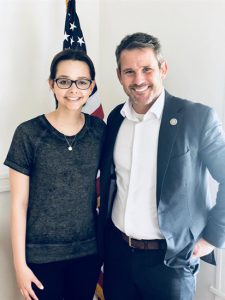
U.S. Rep. Adam Kinzinger (R-IL) has requested more federal dollars be targeted to researching cures and treatments for pediatric cancer.
“Inspired by the passionate advocacy & determination of my #IL16 constituent Megan Bugg, I’ve sent a letter to the @NIH urging for more #pediatriccancer research so young people like her have greater hope for the future – a future free from cancer,” tweeted the congressman on May 25, referring to a 17-year-old, Coal City, Ill., high school junior who is battling Stage 4 of an uncompromising childhood cancer.
Miss Bugg’s pediatric cancer is one of the two main types of pediatric rhabdomyosarcoma: embryonal rhabdomyosarcoma (ERMS) and alveolar rhabdomyosarcoma (ARMS). Hers is the more aggressive type, ARMS, which occurs most commonly in teens or young adults, usually starting in the torso, arms or legs, according to the St. Baldrick’s Foundation, a charity that raises money for childhood cancer research. The other type, ERMS, is the most common type and occurs most often in children under age 10. ERMS is found in the head, neck, urinary tract, or reproductive organs, according to the foundation.
“She has already faced this battle twice before,” Rep. Kinzinger said on May 25. “Her cancer returned for a third time in early 2016 and yet she continues to stay positive. Megan advocates passionately for pediatric cancer research in hopes to make life better for young people like her.”
After meeting Miss Bugg last week, the congressman sent a May 25 letter to Dr. Francis Collins, director of the National Institutes of Health (NIH), urging that he “prioritize research intended to prevent, treat, and cure pediatric cancer.”
“As you know, aside from accidents, cancer is the leading cause of death among children under the age of 14,” Rep. Kinzinger wrote, noting that the American Cancer Society this year estimates that 10,590 children will be diagnosed with cancer and 1,180 will die from it.
The lawmaker detailed for Dr. Collins his meeting with Miss Bugg and explained how she already had endured 90 weeks of chemotherapy, more than 100 radiation treatments, and three surgeries during the last three years.
“At a time where she should be focused on high school, extracurricular activities, and planning her future, Megan must face her teen years with memory issues — often called “chemo brain” — a lifetime of infertility, and an uncertain future,” wrote Rep. Kinzinger.
However, despite such challenges, “Megan has dedicated her time and efforts to raising awareness and fundraising for pediatric cancer research, with hopes to change these daunting statistics,” he wrote.
Rep. Kinzinger also acknowledged that NIH gets “pulled in many directions, from research on mental health to Alzheimer’s disease and beyond, but I encourage you to do all you can to prioritize pediatric cancer, which is a diagnosis a child receives, on average, when they are just six years old.”
The congressman said he hoped Miss Bugg’s story would inspire Dr. Collins’ consideration and inform the NIH director about “how important your work is to millions of Americans and their families.”
“I believe hope is contagious and I implore you to show her there is hope by dedicating more NIH resources to researching pediatric cancers like hers,” wrote Rep. Kinzinger.



